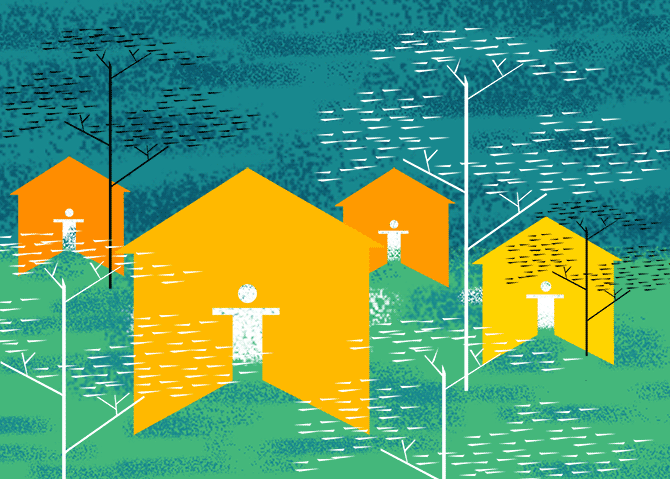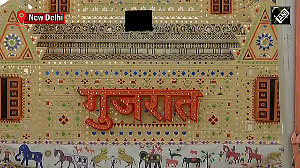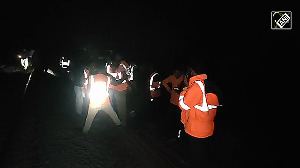The biggest challenge all three faced was that they had had no prior experience in taking an online test, Roshni, Manish and Karan tell Geetanjali Krishna.
Illustration: Dominic Xavier/Rediff.com

Every time I return to Mirzapur, I like to spend time in Project Mala, the NGO which provides the area's best educational facilities free of cost to rural children.
This time, I met three students who got me thinking that we have so much untapped human capital in Indian villages -- but what's the best way to cash it?
Like most students at Project Mala, Roshni, Manish Kumar and Karan Kumar are first generation learners. They live in the school hostel with no external educational aids to rely upon.
Yet, the trio cleared the annual engineering college entrance examination JEE (main) this year.
This is recognised as one of the toughest examinations in the world to qualify, and a herculean feat for these three youngsters to have accomplished.
All three seemed quite unaware of their achievement when I met them. They studied for the JEE exam together, they said, with one practice book between them.
"Our teachers helped us," said Manish. "All we did was a little bit of self-study," said Roshni. "Not a lot, just a little..."
The biggest challenge all three faced was that they had had no prior experience in taking an online test.
"We were quite nervous we'd do something wrong while taking the test!" said Karan. All three felt there was a good chance they won't make the cutoffs for any of the good institutions this time.
Interestingly, this prospect didn't seem to worry them too much.
"I'm happy to have simply come this far," said Karan. "If I don't make the cut this year, I'll probably join a BSc course and try for JEE next year!"
They have applied to other engineering colleges, and even though they would probably be able to get admission in NIIT based on their present performance, none of their families have the means to fund a private engineering education.
Even so, they have become famous in their respective villages now.
"In my village school, I was able to solve a maths problem that the teachers had been unable to solve," grinned Manish. "They promptly offered me a job!"
Roshni was asked to conduct paid tuitions in her village. "Instead, I initiated a free summer school with two other Project Mala students for all the children in our village!" she said.
Later, our conversation veered towards ideas for improving the standards of living in their respective villages.
Roshni and Karan believed that improved schooling was the key to rural development.
"I feel that illiteracy has restricted access to better jobs," said Karan.
Manish was concerned about the paucity of drinking water in his village.
While the two boys were quite open to the idea of leaving their village to go wherever they found better opportunities, Roshni declared she was (at least for the moment) keen to return home and help make her village a better place to live in.
With increased awareness about improving education quality in rural schools, thousands of Roshnis and Karans are evolving in village India, the 'human capital' that the government loves to talk about but is yet to tap.
The question is, should we somehow incentivise these youngsters to not migrate, and strive to improve their communities -- or let them follow their dreams, wherever they might take them (the freedom we accord to our own children)?












 © 2025
© 2025